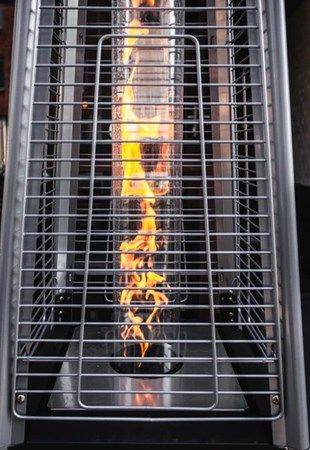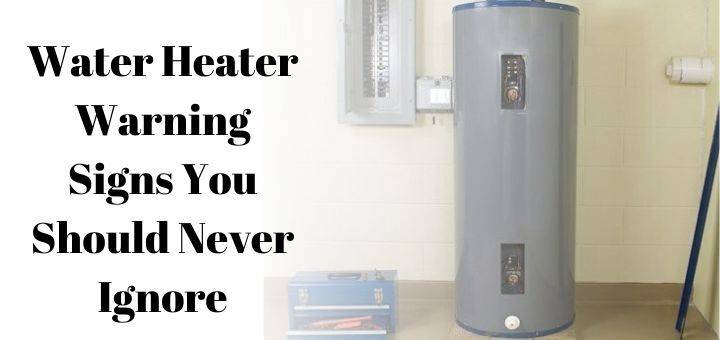Owning a tankless electric water heater can give you desired benefits such as an endless supply of hot water wherever you might want to place it either at a central place or at the point of use which could be at the bathroom or kitchen sink. However, what are the potential water heater danger signs?
In this comprehensive article, we will look at the water heater warning signs which will tell you that your water heater is broken and you need a new water heater.
Nonetheless, an electric tankless water heater could also be a potential danger to your home. In this article, we will look at water heater warning signs, which will tell you that your water heater is broken and you need a new water heater and the dangers that an electric water heater can bring to your home.
Can An Electric Water Heater Explode?
Electric Tankless hot water typically has a longer life expectancy than gas water heaters. They usually last on average, 10-15 years. You can determine how old an electric tankless water heater is simply by decoding the manufacturer’s label.
The label will show you the month, the year, and the week of manufacturing.

If you neglect regular repair and maintenance, the electric tankless water heater will explode because the heated water has turned into gas, and the heat and pressure have become too much for the tank to hold.
The water tank will attempt to release the force through the relief valve, but if the valve is blocked, the internal pressure ultimately causes the tank to explode. This can cause a catastrophic impact on your home, such as blowing through the roof.
Water heater explosions are rare phenomena because they are designed with safety measures such as glass lining, an overfilled tank that creates an air cushion, and a sacrificial anode, which runs from the top to the bottom.
Despite this, however, explosions can occur. Water heaters account for 5800 home fires, according to The National Fire Protection Association (NFPA). These fires lead to deaths, injuries, and loss of property worth millions.
Factors Leading To Hot Water Heater Explosion and Their Warning Signs
Factors that may lead up to the water heater bursting are namely;
- Rust corrosion.
- Sediment build-up.
- Leaks.
- Proximity to flammable
1. Rust corrosion
Internal corrosion is brought up when the sacrificial anode liner, which protects the metal of the tank from rusting, is not replaced, and the coating deteriorates. The rust begins to eat away at the metal walls of the water tank. When the metal walls start getting thin, it will give a warning sign that it’s about to explode.
Typical signs that the water heater is about to explode due to rust corrosion are rust developing at the bottom inside of the water tank, rusty colored water coming from the water heater, metallic taste of water, and rust along the top of the water heater.
What to do when there is rust corrosion on the water heater is,
Firstly replace the sacrificial anode to prevent the rust from building up.
Secondly, drain out the water to remove the rust at the bottom of the water tank.
Thirdly unscrew and remove the drain valve with a wrench to gain access to the bottom.
Finally, use a brush and a vacuum cleaner to vacuum the rust and remove it efficiently.
It’s advisable to regularly check the anode and replace it whenever necessary. There are a variety of anodes in the market that can suit your household need for example;
- About Fluid | MAGNESIUM Flexible Anode Rod Kit for Water Heaters
- About Fluid Aluminum/Zinc Flexible Anode Rod Complete Kit For Water Heaters
- About Fluid Aluminum/Zinc Flexible Anode Rod Kit For Water Heaters
Another way of dealing with the rust problem is probably getting a new water heater because it could be a sign that your water heater is too old.
2. Sediment Build-Up
Common signs of sediment build-up are namely popping, crackling, or rumbling noises in the water heater due to the sediments clumping together at the bottom.
Over time the layer of sediment will insulate the water from the burner, making the water heater work overtime to raise the temperature causing it to overheat; as a result, it could cause colder showers before you get done due to water heater failure.
The crackling and rumbling noises you hear in the water tank are the sediments bubbling up. The overheating and pressure caused will ultimately lead to an explosion if the issue is not checked as soon as possible.
To prevent this from happening regularly, flush the water heater by unscrewing the cap and releasing the water into a bucket. The upside of Flushing your water heater is that it will increase its longevity too.
3. Leaks
Leaking water heaters are brought about when; there is a loose drain valve that slowly drips water, too much pressure inside, or an aging water heater causes leaking due to rusting and corrosion. Nevertheless, the leaking ought to be fixed immediately.
It isn’t advisable to wait till the leak gushes out because you never know when it will be too late. Regularly inspect and monitor the T&P valve in case there are signs of failure of the valve to release the pressure.
An explosion can occur if the T&P valve stops regulating the pressure within the tank as it should be, but instead, it starts leaking the pressure inside.
According to NFPA, water heater leaks were responsible for 8% of home fires; therefore, it is vital to have your water heater replaced by a professional plumber whenever you notice leakage.
You can also regularly test the performance of the valve by flipping the valve switch up and checking if it releases water. If it fails, then the valve has malfunctioned, and it ought to be replaced.
4. Proximity to Flammables
When installing a water heater, it’s essential to ensure it’s not near a source of heat. A botched installation near inflammable can lead to explosions. The combustibles might catch fire and, as a result, drastically increase the pressure inside the water tank, causing it to explode.
It is advisable to keep combustible materials 18 inches from the water heater to prevent a fire hazard.
Recommended Post: Best Tankless Water Heater For Large Homes
Repair or Replace My Water Heater?
Whenever you encounter this dilemma, it’s essential to identify the exact failing and then run a diagnosis of the problem. Some issues causing the water heater to fail can be done with simple DIY methods, while others are best left to certified plumbers to help you.
Common failings include; no hot water, insufficient hot water, slow hot water recovery, and too much hot water. These failings are associated with the thermostat of the water heater.
No hot water or insufficient hot water problem
For Hot water to fail, an electric water heater needs 240 volts of power to operate. If there is a problem with the heating, it could be a result of the circuit breaker tripping. First, check the breaker box. If it has tripped, flip it off then flip it back on again.
If the breaker happens not to have tripped try this DIY diagnostic;
- First, at the service panel, turn off the house circuit breaker for your water heaters.
- Secondly, access the high–temperature limit switch element by removing the access panel then the insulation then the plastic safety guard on the water heater. Be careful of the wires while doing this.
- Thirdly press the red button located above the upper thermostat to reset it then reinstall it.
- Finally, turn back on the heater circuit breaker and check if the water temperature is heating as it should.
If this solves your problem, it could have been caused by overheating. Overheating is caused by a defective thermostat or shorted heating element.
If this does not solve the issue, the problem could be a power supply wiring, so a professional is needed.
Insufficient hot water could be an indication that the demand for hot water in your household is above the supply of hot water that the water heater can give, or maybe the thermostat was set too low.
Typically most water heater is designed with a capacity to hold 75% of hot water whenever it’s used. The water heater could be undersized, and in this case, you can replace the water heater. However, you can also reset the temperature degrees of the thermostat in case it was set too low.
The temperature is too hot
The water temperature should not exceed 120 degrees. Whenever it exceeds this limit, it will scald you. To stop these from happening, check the thermostat setting because it might have been set too high. Perform these easy DIY steps to reset the thermostat.
- Firstly make sure the water heater is turned off at the service panel by removing the access panel then the insulation then the plastic safety guard on the water heater. Please turn it off then use a standard multimeter to confirm.
- Check the heat settings on both thermostats by placing a one-meter probe on the bottom left of the terminal and another on the terminal screw: the recommended setting is between 115 and 125 degrees
- Adjust the temperature reading to 120 degrees.
- Adjust the other thermostat to the same setting
- Bring back the safety guard, insulation, and access panel for each element, and Turn on the electricity supply and the water heaters.
Aged Water Heater
As we have discussed above, the electric water heater typically lasts for 10- 15 years. Over time, water minerals react with steel causing the metal wall to rust and deteriorate. When the metal wall gets thin, it leads to leaking, and at this point, it is a hazard to your home. Repairing an old water heater at this point isn’t an option but only replacing the water heater.
What is the cost of installing a new Water Heater?
replacing a new water heater depends on several factors namely gas or electric, tank or tankless, and the size of your water heater and price generally ranges between $500 to $ 1000
gas water heaters have higher initial installation compared to electric water heaters, which are usually $50 to $100 more.
Tank Water heaters are cheaper when installed compared to tankless water heaters. Still, in the coming years, tank water heaters have higher maintenance cost in comparison to tankless water heaters making them more expensive generally.
The US Department of Energy indicates that a tankless water heater will save you $108 every year compared to $44 for a tank water heater.
The size of the water heater
A larger water heater cost more than a smaller water heater. The size of a lot of water heaters ranges from 20 gallons to 80 gallons. The price difference is 100 dollars.
Why Do Water Heaters Fail?
Water heater failure means that you have cold water showers, lukewarm water, too hot showers, or rusty, muddy, and discolored water.
As we have discussed above, these are attributed to; namely, sediment builds up, which insulates the water from the burner, making the water heater work overtime to raise the temperature causing it to overheat or underheat the water. This leads to excessively hot water or lukewarm water.
The Rusty, muddy, and discolored water is brought by Internal corrosionis brought up when the sacrificial anode liner, which protects the metal of the tank from rusting, is not replaced, and the coating deteriorates. This leads to discoloring of the water and a metallic taste of the water.
When to Replace Hot Water Heater?
Water heater; It could be a gas or an electric water heater that can develop malfunctions either as soon as they are bought or much later after 15 years of service. Either way, a failing water heater can be a time bomb to your home if it is not checked. It’s important to replace the water heater whenever you start experiencing the following issues.
The odor of gas; could indicate a leak with your gas water heater. Also, a metallic smell could mean that your electric water heater has broken down
continued repairs; in case repairs keep adding up, such as something breaking up time and time again, maybe it’s time to get a new water heater.
Age of the water heater. The water heater keeps reinventing with better technology, and if you are still using an older technology water heater, maybe it’s time to say goodbye to your older water heater.
How To Tell If The Water Heater Is Working
water heaters are designed to supply hot water at the point of use; therefore, the first indicator of a working water heater is a continuous supply of hot water at the desired temperature whenever you need it.
Related Post
- 26 Backyard Shower Ideas That Turn Your Outdoor Space Into a Spa - July 11, 2025
- 26 Breathtaking Farmhouse Kitchen Designs to Inspire Your Remodel - July 10, 2025
- 22 Modern Dark Bedroom Aesthetic Ideas You’ll Love and Copy - July 9, 2025

